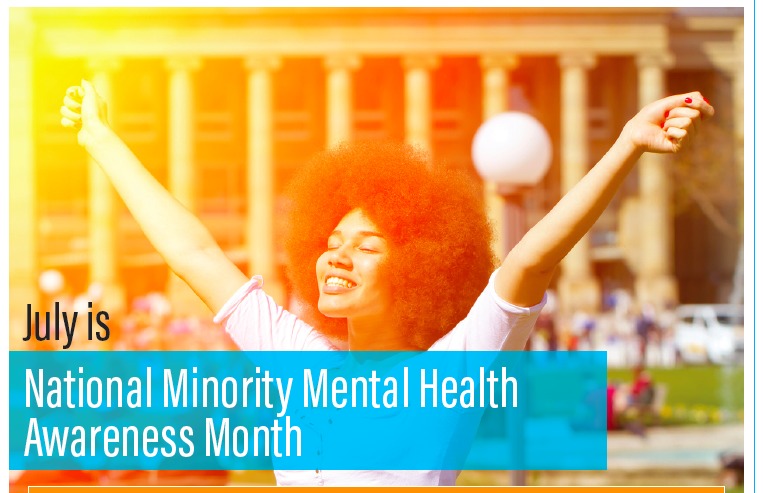
JULY IS NATIONAL MINORITY MENTAL HEALTH AWARENESS MONTH
In 2008, the US House of Representatives designated July as Bebe Moore Campbell National Minority Mental Health Awareness Month, which is now known as National Minority Mental Health Awareness Month. The resolution was sponsored by Rep. Albert Wynn [D-MD] and cosponsored by a large bipartisan group to achieve two goals:
- Improve access to mental health treatment and services and promote public awareness of mental illness.
- Name a month as the Bebe Moore Campbell National Minority Mental Health Awareness Month to enhance public awareness of mental illness and mental illness among minorities.
As part of this effort, The HHS Office of Minority Health joins partners at the federal, state, local, tribal, and territorial levels to help raise awareness about mental illness and its effects on racial and ethnic minority populations.
According to the Substance Abuse and Mental Health Services Administration (SAMHSA):
- In 2017, 41.5% of youth ages 12-17 received care for a major depressive episode, but only 35.1% of black youth and 32.7% of Hispanic youth received treatment for their condition.
- Asian American adults were less likely to use mental health services than any other racial/ethnic group.
- In 2017, 13.3% of youth ages 12-17 had at least one depressive episode, but that number was higher among American Indian and Alaska Native youth at 16.3% and among Hispanic youth at 13.8%.
- In 2017, 18.9% of adults (46.6 million people) had a mental illness. That rate was higher among people of two or more races at 28.6%, non-Hispanic whites at 20.4% and Native Hawaiian and Pacific Islanders at 19.4%.
The Agency for Healthcare Research and Quality (AHRQ) reports that “racial and ethnic minority groups in the U.S. are less likely to have access to mental health services, less likely to use community mental health services, more likely to use emergency departments, and more likely to receive lower quality care. Poor mental health care access and quality contribute to poor mental health outcomes, including suicide, among racial and ethnic minority populations.”
OTHER NEWS
THE CREDIT FOR CARING ACT: What You Need to Know
On May 17, 2017, this bi-partisan proposed bill introduced in the U.S. House and Senate called the Credit for Caring Act, (S.1151/H.R. 2505) would amend the Internal Revenue Code to create a federal, nonrefundable tax credit of up to $3,000 for family caregivers who work while also financially help and assist in caring for their parents, spouses, children with disabilities or other loved ones. Introduced by Senators Joni Ernst (R-IA), Michael Bennet (D-CO), Shelley Moore Capito (R-WV) and Elizabeth Warren (D-MA), and Representatives Tom Reed (R-NY) and Linda Sánchez (D-CA), this bill is an important step toward supporting caregivers…
EDUCATION ISSUE H.R. 610: What You Need to Know
On January 23, 2017 Representative Steve King of Iowa introduced H.R.610 – a bill that would distribute Federal funds for elementary and secondary education in the form of vouchers for eligible students and to repeal a certain rule relating to nutrition standards in schools.
This bill threatens funding to public schools and equal opportunity in education. This bill is designed to take federal funds from public schools by dismantling Block Grants programs and other programs that are in place to assist communities of color.
AWARENESS & ACTION: THE BLACK WOMEN’S AGENDA, INC. HOSTS 39TH ANNUAL SYMPOSIUM WORKSHOP & AWARDS LUNCHEON
WASHINGTON, DC – The Black Women’s Agenda, Inc. (BWA) recently hosted its 39th Annual Symposium Workshop & Awards Luncheon, honoring the achievements of five women and encouraging the more than 1,200 attendees to exert their influence in areas of critical importance to their communities. The organization also welcomed Democratic Presidential Nominee Hillary Rodham Clinton, who addressed participants in the morning workshop.
© 2025 The Black Women’s Agenda, Inc. All Rights Reserved. Privacy Policy





